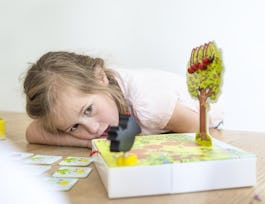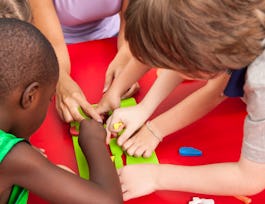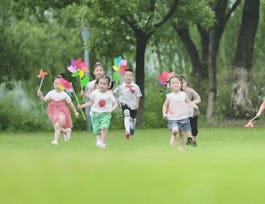In this short course you will explore the possibility that children might acquire written language in a way that is similar to how they acquire spoken language—without instruction. You will encounter various aspects of behavioral science and technology that are relevant to this proposition. You will have the opportunity to learn the the perceptual, cognitive, and neurological capacities of children during their first years of life. You will advance your understanding of children and how they learn language. You will also be more attuned to current advances in the technology of human machine interactions, and what these phenomena imply for learning to read at an early age.


Children Acquiring Literacy Naturally
Taught in English
Some content may not be translated
26,292 already enrolled
(164 reviews)
What you'll learn
Describe the fundamental processes involved in reading.
Explain the natural acquisition of literacy and its implications for society.
Identify possible technological advances in literacy.
Details to know

Add to your LinkedIn profile
See how employees at top companies are mastering in-demand skills


Earn a career certificate
Add this credential to your LinkedIn profile, resume, or CV
Share it on social media and in your performance review

There are 3 modules in this course
Universal literacy, differences between spoken and written language, models of perception and processing, and implications of natural acquisition of reading.
What's included
12 videos1 reading4 discussion prompts
Influences on language learning, iconicity, recognition skills of infants, visual processes in reading, and rapid serial visual processing.
What's included
14 videos2 readings4 discussion prompts
The nature of reading, reading myths, current approaches to teaching reading, demographics of literacy and illiteracy, and technological innovations.
What's included
15 videos1 reading1 peer review3 discussion prompts
Instructor

Offered by
Recommended if you're interested in Psychology

Utrecht University

University of Colorado Boulder

The State University of New York

Peking University
Why people choose Coursera for their career




Learner reviews
Showing 3 of 164
164 reviews
- 5 stars
68.90%
- 4 stars
14.63%
- 3 stars
10.97%
- 2 stars
2.43%
- 1 star
3.04%
New to Psychology? Start here.

Open new doors with Coursera Plus
Unlimited access to 7,000+ world-class courses, hands-on projects, and job-ready certificate programs - all included in your subscription
Advance your career with an online degree
Earn a degree from world-class universities - 100% online
Join over 3,400 global companies that choose Coursera for Business
Upskill your employees to excel in the digital economy
Frequently asked questions
Access to lectures and assignments depends on your type of enrollment. If you take a course in audit mode, you will be able to see most course materials for free. To access graded assignments and to earn a Certificate, you will need to purchase the Certificate experience, during or after your audit. If you don't see the audit option:
The course may not offer an audit option. You can try a Free Trial instead, or apply for Financial Aid.
The course may offer 'Full Course, No Certificate' instead. This option lets you see all course materials, submit required assessments, and get a final grade. This also means that you will not be able to purchase a Certificate experience.
When you purchase a Certificate you get access to all course materials, including graded assignments. Upon completing the course, your electronic Certificate will be added to your Accomplishments page - from there, you can print your Certificate or add it to your LinkedIn profile. If you only want to read and view the course content, you can audit the course for free.
You will be eligible for a full refund until two weeks after your payment date, or (for courses that have just launched) until two weeks after the first session of the course begins, whichever is later. You cannot receive a refund once you’ve earned a Course Certificate, even if you complete the course within the two-week refund period. See our full refund policy.


